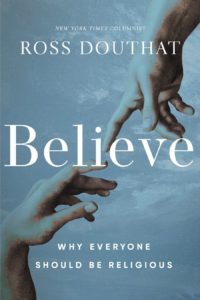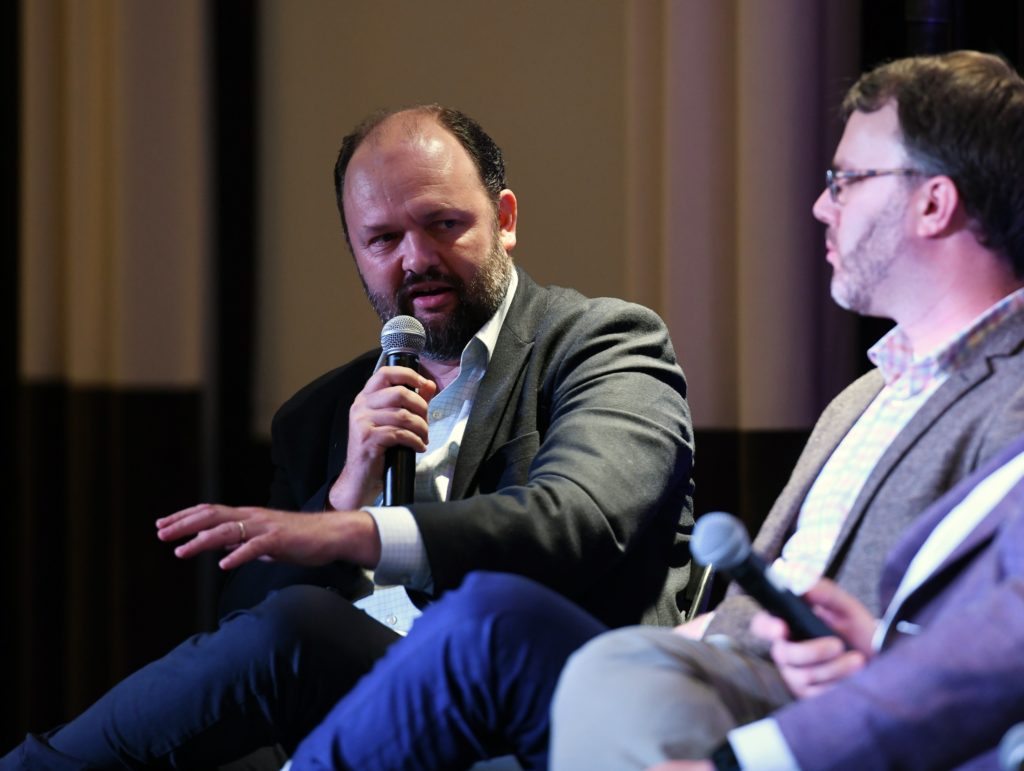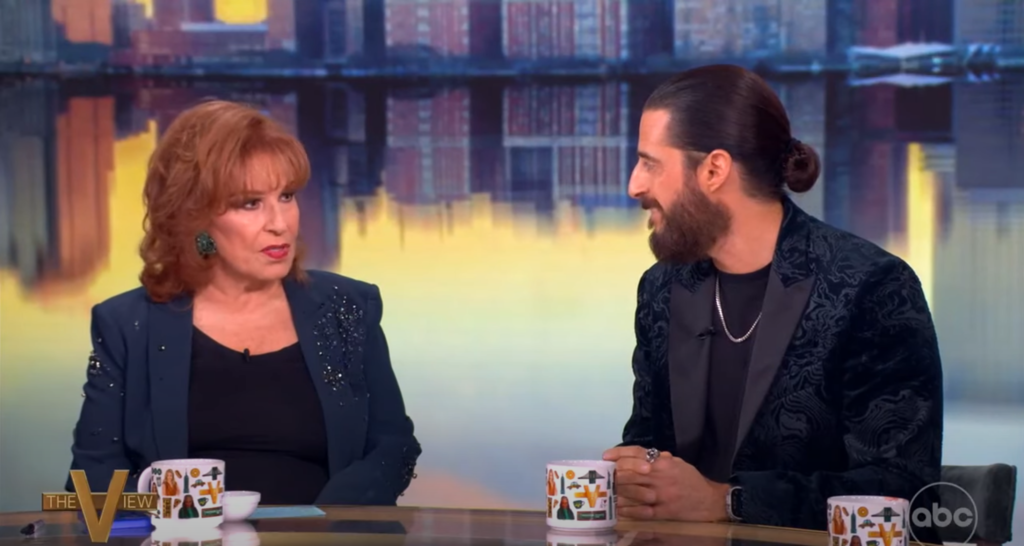Historically, the celebration of Holy Week, Easter, and the 50 days that follow have represented the zenith of the Christian calendar.
But in the year 2025, do Americans care?
The state of religious practice in the U.S. depends on who you ask. On the one hand, Catholicism seems to be having a “moment.” In a recent episode of The Ezra Klein podcast, the host, an opinion columnist at The New York Times, described our current era as more “mystical than technological,” citing an uptick in interest in spirituality writ large, but Catholicism in particular.
There are concrete things to point to: celebrity conversions; the chart-topping Bible and Catechism in a Year podcasts; Hallow reaching No. 2 in the app store at the start of Lent.
Numbers from the recent Religious Landscape Survey conducted by the Pew Research Center lay bare some harder truths: For every one convert the Church gets, she loses 8.4 people through “religious switching” — either finding another faith or abandoning it altogether.
And while the trend of religious disaffiliation seems to be plateauing, Ryan Burge, associate professor of political science at Eastern Illinois University, cautions the numbers will likely go up over time due to “generational replacement.” Basically, baby boomers are nearing the end of their lives as a significantly less religious cohort, Generation Z, reaches adulthood.
The numbers confirm that the task of communicating the good news to a post-Christian America is complicated.
But so far in 2025, two laymen have been working in tandem, though they may now know it, to make this Catholic moment last: Ross Douthat, opinion columnist at The New York Times, and Jonathan Roumie, the actor who portrays Jesus Christ in the television series “The Chosen.”
Their efforts end in the same place: the bold proclamation of Jesus Christ who suffered, died, and rose from the dead and who gives us, through the Catholic Church, the fullness of the means of salvation.

Douthat’s recently released New York Times bestseller, “Believe: Why Everyone Should Be Religious” (Zondervan, $29.99), is not written for the masses. It’s for undergraduates, graduates, and members of the intellectual class who have embraced atheism as their default position, often as a badge of honor.
Given that individuals with advanced degrees are 50% more likely than those with a high school diploma to attend weekly religious services, Douthat has a target rich audience.
To them he writes, “As its promises of liberation dissolve, as unhappiness and angst and regret take over, atheism defends itself by pretending to be hardheaded, extremely serious, the price you pay for intellectual adulthood. It’s none of those things.”
Douthat presents his case for why the religious perspective “asks you to bear the full weight of being human, grounds both intellectual rigor and moral idealism, and has the better case for being true.”
For starters, the Copernican and Darwinian revolutions were supposed to have dismantled religious worldviews. Instead, Douthat said that they have “revealed wider evidence of cosmic order than what was available to the premodern world.”
The universe has precise, measurable order and structure, but scientists still can’t say why, nor can they account for why human beings are uniquely positioned to comprehend so much of it.
He also takes on neuroscience, which was supposed to reduce the mind to matter by explaining emotions as the mere firing of neurons, and thoughts as the result of electrical impulses. But Douthat points out that consciousness, a “supernatural” or “super-material” phenomenon, remains a mystery.
Moreover, the supernatural keeps breaking through to believers and nonbelievers: near-death experiences point to something after this life rather than nothing; exorcisms are still performed with terrifying details; and physicians do not know why their incurable patients are healed.
The author also provides answers to the major “stumbling blocks” to belief: you need not reject your family’s faith just because it is inherited; religious people have done despicable things in the name of God, but so have others for family, business, and other goods. And major religions, especially Catholicism, hold positions on extramarital sex because “once you accept that the universe was probably made with us in mind, that there is some cosmic purpose to human consciousness and human lives, then why wouldn’t God or the cosmos care about the most important way that human beings bond with one another, create the most intimate and the most sprawling intergenerational forms of community, and participate in the creation of new life?”
Douthat encourages readers to start by seeking answers where they are naturally drawn.

But he goes further, saying that while all of this could lead him to conclude that some amount of truth can be found in all religions or that he could practice Catholicism without claiming that it contains the fullness of God’s revelation, he doesn’t.
The Jesus “event” — the incarnation, crucifixion, and resurrection — was not just some “spike on the graph” in the history of a cosmos made for us, “not a flash of light but a window flung wide open.” Douthat ends with urgency, begging his readers who now see to believe.
But what about everyone else? What about people not likely to pick up a book like “Believe”?
“Ordinary people always have room to take in the mystery,” Pope Francis has said. “Perhaps we have reduced our way of speaking about mystery to rational explanations; but for ordinary people the mystery enters through the heart.”
Enter Jonathan Roumie, who has been on a media blitz discussing his experience playing Jesus Christ as well as his deepening relationship with the person he portrays.
In recent weeks Roumie has appeared on “The Tonight Show with Jimmy Fallon” and “The View” to promote the upcoming fifth season of “The Chosen,” which chronicles the events of Holy Week.
Those television programs combined have an average of 3.8 million viewers. His Ash Wednesday interview with Tucker Carlson was viewed by 1.3 million people.
And according to “The Chosen’s” streaming data, 240 million individuals have watched the series worldwide, 30% of whom self-identify as nonbelievers.
In his interview with the hosts of “The View,” Roumie said nonbelievers are drawn to “the greatest story ever told,” especially one of high cinematic quality. He likens “The Chosen” to an “Ignatian insight into the Gospels,” in which people place themselves in the story, using their senses and imagination to engage Scripture.

“No matter where you are in the journey of faith, whether you are just getting familiar with the Bible or you’ve been a lifelong student for decades … there’s so much to learn, there’s so much to be able to live out in your life in trying to reach those ideals, reach that bar that [Jesus] set,” he shared.
While fans of the show often project onto Roumie Christ’s attributes, he has shared how at times he’s felt unworthy of playing him.
“These are holy words said by the holiest being ever to walk the earth,” he shared with Carlson while choking up. His director has at times encouraged him, reminding him that they are doing this “so the world may know his story, and those who haven’t heard his story may know the impact he’s had on the world and on our lives personally.”
Like Douthat, Roumie tries to provide an avenue for seekers and believers of different faith traditions to meet Jesus. But ultimately, he also believes, the Catholic Church “feels like the truth as I understand it in God’s eyes.”
“It is the Church that Christ himself ultimately started. For reasons God knows and despite every effort to thwart it … it didn’t happen. And that means something to me.”
Forty years ago, St. Pope John Paul II taught that evangelizing cultures that left Christianity behind would require “new ardor, methods, and expressions.” Ten years ago, Francis asked, “Are we still a Church capable of warming hearts? A Church capable of leading people back to Jerusalem? Of bringing them home?”
The jury is still out, given the numbers of people in the pews. But in 2025, it’s clear that two American Catholic men with incredible influence in today’s media environment are offering a shot in the arm to Catholics who might not have big platforms, but who surely have people in their lives who would like to believe.

